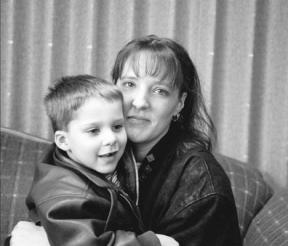As bombs fall on Baghdad, three South Whidbey women are waging daily battles of loneliness and fear. They are wives of Navy men serving aboard ships in the Persian Gulf.
These women, like other military spouses, are left behind to hold their families together and provide emotional support for their children. While they find peacetime overseas deployment difficult, war has them wondering daily whether their husbands will come home alive.
But for Rebecca Eslinger, Starla Lowe and Holly Nelson, the wait just got a little easier. They met each other for the first time this winter and have formed a band of women waiting for their men to come home from war. They now head a South Whidbey support group for women with husbands at war.
“Finding someone to confide in is difficult,” said Eslinger. “We are isolated here on the Southend away from other military families. Only another wife can understand the different emotions each day brings, the ups and downs and the waiting.”
Eslinger, whose husband, Jason, is a petty officer first class on the aircraft carrier USS Abraham Lincoln, wants others with family members serving in the military to join the support group. It’s not for wives only.
Support is available at Navy bases, like those in Oak Harbor or Everett, but with young children and a limited budget, travel to those cities is inconvenient and expensive.
On top of that, Eslinger said, those groups do not give support to everyone that needs it.
“Those groups are set up for wives not children, parents, brothers, sisters or grandparents. I am hoping to draw more people in to our group,” Eslinger said.
But for now, it’s just moms.
Eslinger met Holly Nelson two months ago because both their sons are in Cub Scouts. Nelson’s boyfriend, Gary Jaeckins, petty officer second class, is also aboard the Lincoln. There is a common thread between them, because Eslinger’s husband knows Jaeckins.
Starla Lowe joined the group later, after her husband went out on his third deployment.
Waiting and worrying
Lowe said saying goodbye to her husband doesn’t get any easier over time, especially this time when both knew he was headed into war.
“It’s the not knowing when or if he will be coming home,” she said.
Lowe is grateful for the new contact with the other two women
Her husband Kevin, a petty officer first class, is on board the aircraft carrier USS Constellation.
In their support group, the women talk about the difficult issues that go with staying behind. For example, Lowe finds explaining war to her two children difficult.
“Our 5-year-old, Dylan, wants to know why there are so many bombs and will they hurt his dad,” she said.
Thanks to the Internet and telephones, the women are in contact with their husbands weekly, sometimes daily. All three say that helps a lot.
But when Nelson doesn’t hear from boyfriend, Gary, her imagination takes over.
“I worry that his ship has been hit, or he’s fallen overboard.”
Telephone calls are wonderful and painful at the same time.
“Actually, hearing his voice is great,” Nelson said. “We can talk about the daily stuff and everything seems normal. But the connection is often broken and that’s hard. Just saying goodby is difficult, because I don’t know when I will talk to him again.”
All three women expressed concern about the mines in the gulf and biological warfare. Nelson always reminds Gary to keep his gas mask with him.
Eslinger uses e-mail messages to contact her husband. The messages cover daily events at home. She said she tries to write upbeat news about the couple’s three boys, 9-year-old Levi, 8-year-old Dakota and 4-year-old, Triston.
Conversations on the phone are just too brief to do that, she said.
“On the telephone, it’s mostly hi honey I love you and miss you.”
Then there is the news that comes to them without a call or an email, the news that comes through the media.
The television war, Eslinger said, has been a comfort thus far for her and Nelson, but it is difficult for Lowe to watch.
She said the war scenes are disturbing.
Why is life so hard?
Adding to the emotional stress are daily household burdens and financial struggles.
“My husband is defending our country and yet his family barely gets by with the basics. It doesn’t seem right,” Eslinger said.
Eslinger said when her family lived on military bases, it was common for families to get together at the end of the month for potluck dinner. That’s impossible to do on South Whidbey, at least at the moment.
“We would just pool whatever food we had left and have a big dinner,” she said. “We hope to start doing that here on the Southend.”
And there are other issues. Eslinger’s oldest son has been diagnosed with depression. It’s another challenge she is facing alone
“He has always been in military base schools where there were older kids to support the younger ones,” she said. “It’s not that way here.”
Eslinger knows how that can feel. She has lived on South Whidbey for two years and has found making new friends difficult.
“I stay busy during the day, but the worst time for me is after the kids are in bed then I let down,” she said.
But she said that each day is a day closer to the end of the war.
With the support of the other women and other families, she said, the wait will be easier.


